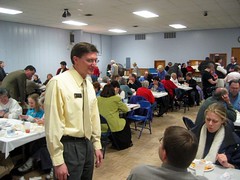Why have non-profits with prominent donors suddenly started saying "yes" to blight?
COLUMBIA, 6/15/12 (Beat Byte) -- Central Missouri Community Action was the first Columbia-based non-profit mentioned as a possible supporter of City Hall's now infamous Blight Decree/EEZ, because it might create jobs and reduce poverty. The agency appeared in an April 9 Columbia Daily Tribune story that suggested CMCA director Darin Preis and his board of directors were ready to support the project.
But that wasn't true, Preis told the Heart Beat, making clear distinctions between CMCA and other non-profit groups such as the Food Bank and United Way that publicly support the Blight Decree/EEZ. Preis sat down to answer questions about his agency, and an issue that has created considerable controversy: non-profit support of blight.Heart Beat: Who contacted you about the EEZ prior to April 9? Did anyone with REDI contact you? Whom have you talked to about it?PREIS: I attended the Central Missouri Development Council (CMDC) meeting on April 4 because I heard [REDI chairman] Dave Griggs would be presenting information about the EEZ. At that time I had a passive but growing interest in the topic.Nobody had contacted me prior to this meeting. I had, however, also attended Boonville Industry Council meetings where the Cooper County EEZ was proposed. I heard conversation about the merit, or lack thereof, of tax abatements, but no questions or concerns about the necessity of applying "blight" to nearly the entire county.
Tribune reporter Andrew Denney called me on April 5 to get a comment on the EEZ because I had mentioned to Tribune reporter Jodie Jackson that CMCA's board might consider endorsing the EEZ (following the Central MO Development Council meeting). It was an off-handed remark not designed to initiate an article, but in retrospect, was probably too juicy to let go.[Tribune publisher Vicki Russell is REDI vice-chairman and the Tribune is a REDI investor.]On April 16, Heart of Missouri United Way director Tim Rich sent a request for opinion on the EEZ to a host of non-profits. I invited [REDI director] Mike Brooks to present to our board of directors at our April meeting. [REDI vice president] Bernie Andrews presented to our board on April 26. I have had no other communication with REDI staff on this topic.Heart Beat: You say you support the EEZ personally, but in the April 9 Columbia Daily Tribune story, you say "We're not going to solve this problem of poverty with programs." Isn't the EEZ another program? Why the contradiction?PREIS: Yes, the EEZ is another program, and not one that will end poverty. But it could be an important tool. I have never said, nor will I ever say, that we shouldn't have programs to serve the poor. I believe that we, as a society, absolutely have an obligation to help those in need. CMCA offers a utility assistance program and it will not solve poverty, but it helps thousands of individuals and families with low income each year that struggle to pay their bills. If all jobs were created with the minimum wage prescribed by the EEZ, we'd be a lot closer to real solutions to poverty.
Heart Beat: Why should readers believe that CMCA has taken no position on this, when one of your own board members, Connie Bowman, clearly spoke in support of the program to the Tribune? When you are telling me here that you support it? When several other non-profits have lined up behind it?PREIS: I said that our board has not taken action on this topic, not that individual board members don't have opinions about it. Several other board members shared their opinion during the board meeting on April 26. One of them made the interesting comment, "Why would we want Columbia to have an EEZ? It would just make Columbia more competitive, and more difficult for Fayette to attract business."Still other board members expressed that the CMCA board shouldn't take positions on local issues because we are trying to apply our services across mid-Missouri.Heart Beat: Why not just stay out of this, period? Why is your organization suddenly becoming involved in political programs at this level? You yourself characterized this move as a "shift." Why the sudden shift?PREIS: The shift is not sudden. We have been implementing our strategic plan for the last five years. A significant portion of this plan calls for CMCA to "engage the community" around issues of poverty. We have eased into this approach by building and strengthening our partnerships. In October of 2011, we started hiring Community Organizers with the intent to proactively seek opportunities to work with other groups. Involvement in the EEZ issue is but one opportunity to let the community know that we intend to continue moving in this direction.
The easiest thing for me to do would be to do nothing. Nobody would care, it wouldn't hurt CMCA's ability to operate, and I could simply manage our agency. However, I got into this because I believe in what CMCA is trying to do. I believe that our shift will make a bigger difference than without it.
Sidebar
Mobile Menu

 The Columbia Heart Beat
COLUMBIA, MISSOURI'S ALL-DIGITAL, ALTERNATIVE NEWS SOURCE
The Columbia Heart Beat
COLUMBIA, MISSOURI'S ALL-DIGITAL, ALTERNATIVE NEWS SOURCE

11
Wed, Feb
